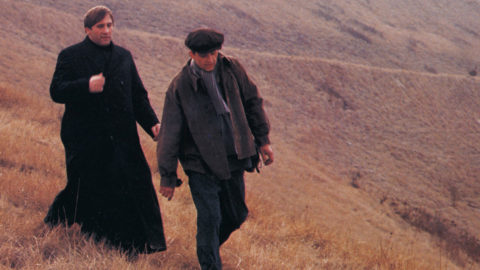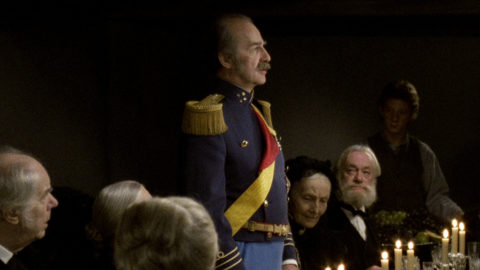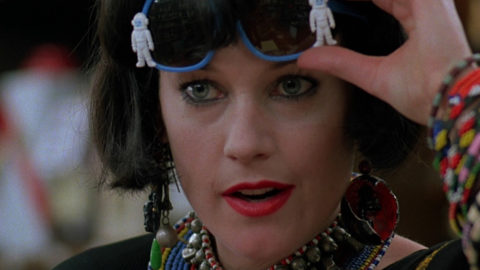Cannes Staycation: The 1987 Edition—Part Three
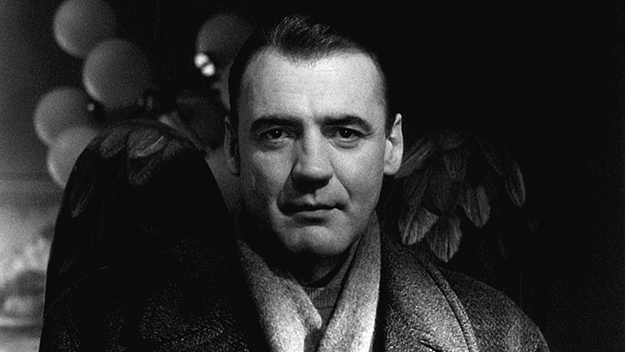
Wings of Desire
By the end of his Cannes book Two Weeks in the Midday Sun, Roger Ebert has left France and is checking the news in Heathrow for updates about the award winners. The biggest champions were Maurice Pialat’s crisis-of-faith drama Under the Sun of Satan, which claimed the Palme d’Or; Tengiz Abuladze’s Repentance, a boisterous yet blistering study of dictatorship in then-Soviet Georgia, unanimously voted the Grand Jury Prize, aka the silver medal; and Wim Wenders’s Wings of Desire, reaping the Best Director award for its sublime and heartsore ruminations on, in, and above Berlin. None of these films merited a single previous mention in the preceding 180 pages. Reading that time capsule of Cannes ’87 today, I find myself savoring the idea, utterly antique in this age of the hot take, of cutting an idiosyncratic path through Cannes, following personal peccadilloes rather than an editor’s hunger to cover all bases or one’s own abstract notion of what is “unmissable.” Then again, it’s hard not to blanch at how blithely Ebert skips the movies that deservedly constitute that festival’s primary artistic legacies.
Wings of Desire, with its cosmic scope, lissome montage, and exquisite black-and-white lensing by Henri Alekan, had the halo of a prizewinner once it debuted on the second-to-last day of Competition screenings. The first half, especially, as the angels eavesdrop on the unspoken thoughts of Berlin’s subway passengers, library patrons, moony acrobats, and car-crash victims, remains one of cinema’s most exhilarating feats of poetic world-building. Granted, I never feel as fully absorbed by the second hour, which forsakes some panoramic sweep and political resonance in centering the poignant encounter between Bruno Ganz’s wonderstruck angel and Solveig Dommartin’s pensive trapeze artist. In this respect, Wings is a near-converse of Repentance, a gutsy act of national and historical self-scrutiny that Communist authorities kept out of circulation for three years after filming. Repentance amplifies its ideological statements more as it goes, whereas Wings shows a growing affinity for wistful lyricism. Wenders gazes rapturously upward, but Abuladze digs in the soil; Repentance’s catalyzing event is the nightly exhumation of recently deceased autocrat Varlam Aravidze (Avtandil Makharadze, in one of two major roles). Starting as surrealist farce, Repentance evolves into a courtroom drama, political chronicle, and Oedipal crucible. What the movie occasionally lacks in stylistic refinement, it more than compensates in rhetorical daring and novelistic depth. Wenders shows us what cinema can imagine, Abuladze what it can commemorate and critique.
It says a lot, then, that I still believe Under the Sun of Satan fully earned its Palme—ironic, too, since it remains one of the least popular victors in Cannes’s history. Inspired by the same author who wrote the source texts for Bresson’s Diary of a Country Priest and Mouchette, Satan shares their capacities for evoking faith and doubt in equal, indelible measure. Gérard Depardieu stars as a floundering priest walking a great distance to heal a sick child; along the way, his story intertwines with those of a guilt-racked teenage murderess and a seductive horse-trader who may be the Devil himself. You don’t remember Satan as much for what happens in it as for the visual and thematic intensity with which it joins the holy, the horrific, and the utterly mundane, and for how palpably it externalizes Donissan’s anguish, without the actor or the movie overdoing it. Reissued last year on a gorgeous Blu-ray from Cohen Media Group, Satan combines the exquisite technique of Wings with the affective urgency of Repentance. At 97 minutes, it styles itself less overtly as an Event than those two do, but once under your skin, it never leaves.
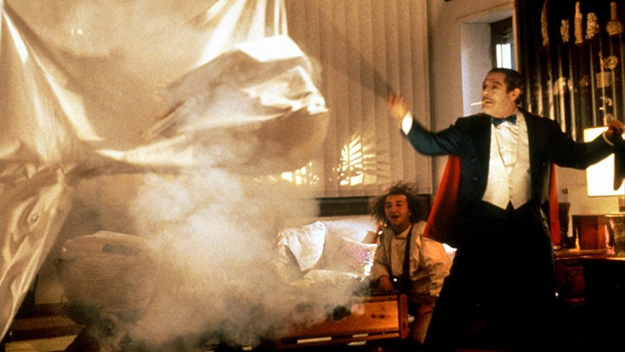
Intervista
Jury president Yves Montand publicly admitted that Pialat’s movie was a compromise choice to win. He wished he could have anointed Fellini’s Intervista, an Out of Competition premiere on the last full day of the fortnight, and a blatant exercise in personal nostalgia, with Fellini revisiting Cinecittà studios and running into his most famous collaborators on both sides of the camera. By the time he reunites Anita Ekberg and Marcello Mastroianni—the latter sporting a magician’s cape, shilling erectile-dysfunction remedies on TV—so they can watch their iconic Trevi Fountain scene from La Dolce vita through middle-aged eyes, you have either submitted to Intervista’s fond drafting off past glories or come to resent it. The same might go for fellow nostalgist Woody Allen, whose Radio Days eschews any single protagonist or central plotline, its camera often panning left or right as if turning its dial toward another subplot or character on another frequency. Fellini’s Amarcord offers the blatant template for this artful, amiable movie’s finale; once again, though, Allen walks a thin line between plagiarism and pastiche.
Indeed, few of the pre-branded auteurs who brought new work to Cannes in 1987 substantially expanded their fan base. Francesco Rosi’s Márquez adaptation Chronicle of a Death Foretold, Shohei Imamura’s brothel-centered historical drama Zegen, and the Taviani Brothers’ Good Morning, Babylon, about two Italian brothers who trek to the U.S. and help build the set for D.W. Griffith’s Intolerance, failed to rouse critics or audiences. Carlos Diegues’s Subway to the Stars, about a saxophonist whose search for his missing girlfriend takes him on a top-to-rock-bottom tour of Rio, landed strongly with Brazilian viewers but resonated less outside its home country. Norman Mailer, a member of Montand’s jury, retired the rough experimentalism of his earlier cinematic forays, but Tough Guys Don’t Dance, his version of a contemporary New England neo-noir, is so narratively broken and tonally calico that you’d hardly call it commercial. Most didn’t even call it good, despite the deadpan hilarity of, say, bottle-blonde Frances Fisher hissing out, “I made a lot of movies. Triple-X movies. Now I’m into real estate. Santa Barbara.”
The altar of the director, where Cannes perpetually lights its votive candles, felt especially vandalized by Aria, a closing-night portmanteau of ten shorts by ten (male) directors, each built around an excerpt of Puccini, Wagner, or another opera luminary. Jean-Luc Godard, who observes meathead bodybuilders working out to Lully’s Armide, and Robert Altman, who remounts Marat/Sade at a Rameau performance, wittily take the piss out of an exercise with no real vision and a half-dozen nadirs. Mid-level French director Claude d’Anna generated many more striking and musically attuned images in his filming of Verdi’s Macbeth, another Out of Competition attraction, than Nicolas Roeg, Julien Temple, or utterly benighted Bruce Beresford achieved with much freer rein. Auteurist hopes hung mostly on still-nascent talents like Lars von Trier, with his noodly and perverse anti-horror film Epidemic, withholding all shocks till its gruesome climax, and Aki Kaurismäki, whose Shadows in Paradise, a requiem for a trash collector, introduced more viewers to his quickly trademarked melding of jewel-toned palettes and downcast spirits.
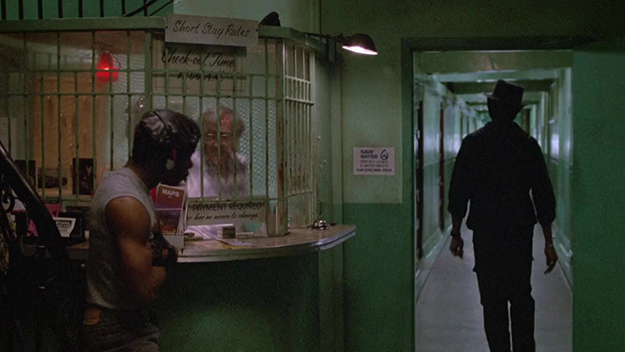
Street Smart
Some of the pleasures of Cannes ’87, especially toward the end, instead found major directors subduing their own self-displays in favor of showcasing their collaborators. Pulpy urban thriller Street Smart, unostentatiously helmed by past Palme winner Jerry Schatzberg, coaxed performances from Kathy Baker and newcomer Morgan Freeman that people still talk about. Barbet Schroeder had similar success with Barfly, which promotes Charles Bukowski’s voice over the filmmaker’s subtler eloquence. Faye Dunaway unquestionably ought to have won the Competition’s Best Actress award, and the film’s unique humor, its feel for Bukowski, and its photographic ingenuity, care of Robby Müller, impress even more on return trips. In Someone to Love, Henry Jaglom warmly managed the trick of starring in his own Intervista-like homage to cinema as a glorious, dying art form and to his own labors within it, without seeming to preen. Instead, the film is a roomy, rounded, and funny portrait, satiric but affectionate, of Hollywood’s wayward romantics and its struggling talents (and quasi-talents, and talentless tourists), ending with Orson Welles uproariously haranguing Jaglom for making a film nobody will watch.
It was almost possible to leave Cannes ’87 believing that with a few, self-consciously august exceptions (Pialat, Cissé, Khleifi, Wenders), the best way to make a contemporary movie was to act like you were making a bad one (Jaglom), or to make it years earlier and belatedly get to show it (Kieślowski, Abuladze). You could risk a splashy authorial signature as long as the movie worked at the mall (Demme’s Something Wild, the Coens’ Raising Arizona). If you wanted cinephile approval, best not to make a big show of your guiding hand (Axel, Ouedraogo, Schroeder, Malle). These patterns had coalesced so strongly by the end of the fortnight that one can hardly overstate the giddy delight of Nana Dzhordzhadze’s Robinsonada, or My English Grandfather, the 76-minute curiosity that closed Un Certain Regard, scooping the Caméra d’Or for best first feature. Robinsonada, another entry in a great year for Georgian cinema, was the only movie at Cannes as accomplished and ambitious as Blind Chance or Wings of Desire but as frisky and innovative as Something Wild. A tragicomic rise-and-fall of an English telegraph engineer trying to link the Caucasus to the Western world, only to discover the country’s magical, stubborn, and occasionally violent singularity, Robinsonada offers a kaleidoscope of film stocks, tinted plates, documentary inserts, sexual seductions, metafilmic japes, and broad jokes that actually work. Imagine a Guy Maddin film that maintained its hold on story while acing every detour and justifying each embellishment, making the known world of history as entrancing as its own, purely fabricated cosmos. Like a lot of the best movies from Cannes ’87, this one is tricky to acquire now, but history buffs, hard-core formalists, and fans of unpredictable storytelling will all relish it. This kind of discovery, even when it too quickly fades from view, is the best argument for Cannes.
CANNES 1987 TOP TEN
- Under the Sun of Satan (Pialat)
- Robinsonada, or My English Grandfather (Dzhordzhadze)
- Wings of Desire (Wenders)
- Repentance (Abuladze)
- Wedding in Galilee (Khleifi)
- Yeelen (Cissé)
- Blind Chance (Kieślowski)
- Yam Daabo (Ouedraogo)
- … And the Pursuit of Happiness (Malle)
- Something Wild (Demme)
Nick Davis is a professor of film, literature, and gender studies at Northwestern University. He also writes film reviews at www.NicksFlickPicks.com.



